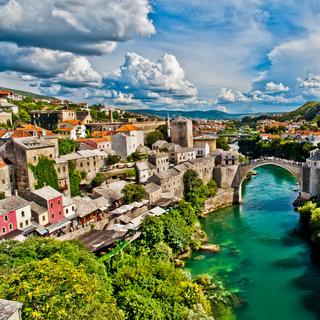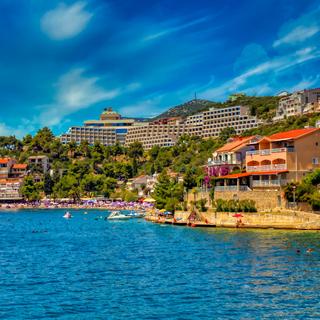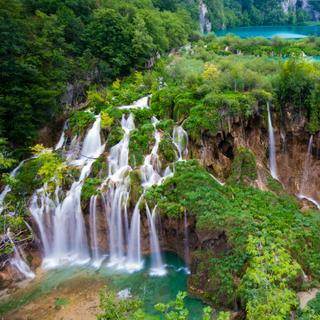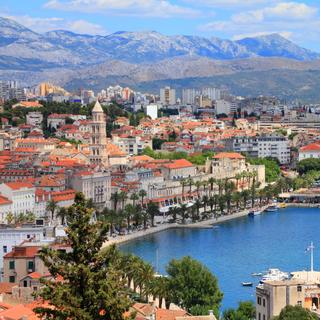Banja Luka weather and climate in 2026
Day
7 °C
Night
-2 °C
Sea
0 °C
Precipitation
58 mm
in month
Rainy days
9 days
in month
Daylight
10 hours
average
Sunshine
3 hours
average
Humidity
77 %
Weather charts for Banja Luka
Find more destinations like this
Closest destinations for Banja Luka
Closest cities for Banja Luka
Weather overview for Banja Luka
Weather overview
Banja Luka (Bosnia and Herzegovina) is a place with a mild continental climate. The day temperatures range from 5 °C (41 °F) in January to 29 °C (84 °F) in July. Temperatures during the night go from -3 °C (27 °F) in January to 15 °C (59 °F) in July. The driest month is August with just 8 days of rain, on the contrary, the month when it rains the most is May with 12 days of rain.
January weather
The number of rainy days starts to descent, with its value of 9 days in Banja Luka, and the rainfall amount starts to descent as well in January. The night temperature is on its minimum, the value of this measure is -3 °C (27 °F), and the minimum of the day temperature can be noticed as well, the value of this measure is 5 °C (41 °F). The number of sun hours (without clouds) rise's start could be observed in this month.
February weather
The rainfall amount is on its minimum in Banja Luka. The day temperature starts to rise, and the night temperature starts to rise as well, with its value of -2 °C (28 °F). The rise of the number of sun hours (without clouds) can be observed.
March weather
The number of rainy days starts to rise, its value is 10 days in Banja Luka, and the rainfall amount rise's start could be observed too, with its value being 77 mm (3.02 in). The rise of the night temperature can be observed, the value of this measure is 2 °C (35 °F), and the rise of the day temperature can be observed as well, with its value of 13 °C (55 °F). The maximum of the wind speed is observable, its value is 2. The number of sun hours (without clouds) continues to rise, with its value being 5 hours.
April weather
The day temperature continues to rise, its value is 18 °C (64 °F) in Banja Luka, and the rise of the night temperature can be observed too. The number of rainy days continues to rise, the value of this measure is 11 days, and the rise of the rainfall amount can be observed too, with its value being 85 mm (3.36 in). The number of sun hours (without clouds) rises similarly to the previous month, the value of this measure is 6 hours.
May weather
The day temperature continues to rise, the value of this measure is 23 °C (73 °F) in Banja Luka, and the rise of the night temperature can be observed as well, the value of this measure is 11 °C (51 °F). The tourist season is at its beginning. The maximum of the number of rainy days can be noticed, with its value of 12 days. The rise of the number of sun hours (without clouds) can be observed, the value of this measure is 7 hours.
June weather
The rise of the day temperature can be observed, its value is 26 °C (79 °F) in Banja Luka, and the night temperature rises similarly to the previous month as well, with its value being 14 °C (56 °F). The ongoing tourist season is noticeable. The rainfall amount is on its maximum in this month. The number of sun hours (without clouds) rises similarly to the previous month, the value of this measure is 8 hours. The maximum of the day length is observable, its value is 15 hours.
July weather
The day temperature is on its maximum, its value is 29 °C (84 °F) in Banja Luka, and the night temperature reaches its maximum as well in July. The tourist season continues. The rainfall amount starts to descent in this month. The minimum of the humidity is observable in this month. The maximum of the number of sun hours (without clouds) is observable, its value is 9 hours.
August weather
The minimum of the number of rainy days can be noticed in August in Banja Luka. There is pending tourist season. The beginning of the descent of the night temperature could be noticed, the value of this measure is 15 °C (58 °F). The number of sun hours (without clouds) descent's start could be observed in August.
September weather
The beginning of the descent of the day temperature could be noticed, its value is 24 °C (76 °F) in Banja Luka, while the descent of the night temperature can be observed, with its value being 10 °C (51 °F). The beginning of the rise of the number of rainy days could be noticed, its value is 10 days, and the rainfall amount starts to rise too, with its value being 92 mm (3.64 in). The tourist season continues. The descent of the number of sun hours (without clouds) can be observed, its value is 7 hours.
October weather
The rainfall amount starts to descent, its value is 82 mm (3.22 in) in Banja Luka. The day temperature descents similarly to the previous month, and the night temperature continues to descent as well, with its value of 7 °C (45 °F). The minimum of the wind speed is observable in this month. The number of sun hours (without clouds) continues to descent, the value of this measure is 5 hours.
November weather
The beginning of the rise of the number of rainy days could be noticed, its value is 11 days in Banja Luka, and the rainfall amount starts to rise too in November. The day temperature descents similarly to the previous month, its value is 11 °C (51 °F), and the descent of the night temperature can be observed as well, its value is 3 °C (37 °F). The descent of the number of sun hours (without clouds) can be observed.
December weather
The night temperature continues to descent, with its value being -1 °C (30 °F) in Banja Luka, and the day temperature continues to descent as well, its value is 6 °C (42 °F). The maximum of the humidity is observable, with its value of 84 %. The number of sun hours (without clouds) is on its minimum, with its value of 2 hours. The minimum of the day length can be noticed, its value is 9 hours.
FAQs
How windy is Banja Luka in March?
In March in Banja Luka, there will be an average wind scale of 2. It is rather a milder or unnoticeable wind, therefore it will not bother you during your holiday.
How many sunny hours can I expect in Banja Luka in April?
There is an average length of sunshine of 6 hours per day in April in Banja Luka. This indicator is higher by 1 hour than in the previous month. This is an increase of 27 %.
Is May part of the wet season in Banja Luka?
No, there is no wet season in Banja Luka in May - you can expect 12 days of rain during the month.
What is the night temperature in June in Banja Luka?
The average night temperature in June in Banja Luka is 14 °C (56 °F). Nights can be cooler, morning running can be refreshing but choose appropriate clothing, evening outdoor sitting can be pleasant but you can also be cold. This indicator is higher by 3 °C (37 °F) than in the previous month.
What is the temperature in Banja Luka during the day in July?
The average daily temperature in Banja Luka in July is 29 °C (84 °F). The ideal temperature for enjoying sunbathing by the water and a good temperature for other activities. For some people, it will be too hot in the direct sunlight and the stay may not be so pleasant. An increase of 3 °C (37 °F) compared to the previous month. Don't forget to pack flip-flops, sunscreen, and a hand fan if necessary - it may come in handy.
Is it hot in August in Banja Luka?
In August in Banja Luka, you will enjoy nice warm weather, but it will also be pleasant and you probably won't feel hot.
Is September a good month to visit Banja Luka?
September is a good month to visit Banja Luka. The temperature during the day will be nice 24 °C (76 °F). There are only 10 days of rain in the whole month, so you can leave your umbrella at home. The temperature of 10 °C (51 °F) at night may make it better to dine inside or to put on more clothes for a dinner outside.
How many days of precipitation on average can I expect in Banja Luka in October?
There are 9 days, which are rainy in Banja Luka in October, that is, days with precipitation more than 2 mm (0.08 in). Converted to days of the week, this means that it will occur on an average of 2.2 days of the week, or in general - 32 % days.
We make the most from 40 years of historical weather data to predict the best weather conditions.
Deciding on where to go for a holiday is hard sometimes. Get inspired by the most popular destinations.
We aggregate data from combining multiple weather sources to ensure accuracy of the highest order.







